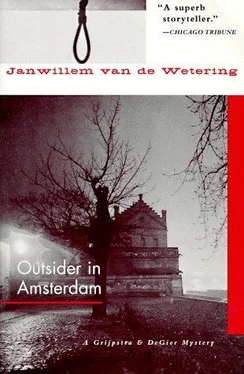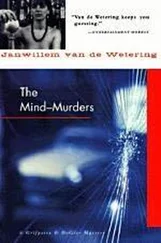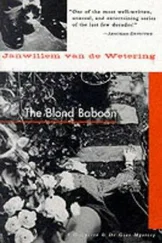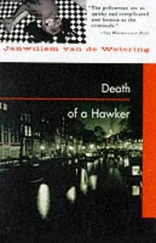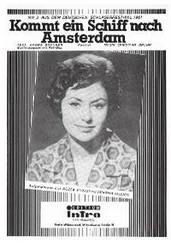Janwillem De Wetering - Outsider in Amsterdam
Здесь есть возможность читать онлайн «Janwillem De Wetering - Outsider in Amsterdam» весь текст электронной книги совершенно бесплатно (целиком полную версию без сокращений). В некоторых случаях можно слушать аудио, скачать через торрент в формате fb2 и присутствует краткое содержание. Жанр: Полицейский детектив, на английском языке. Описание произведения, (предисловие) а так же отзывы посетителей доступны на портале библиотеки ЛибКат.
- Название:Outsider in Amsterdam
- Автор:
- Жанр:
- Год:неизвестен
- ISBN:нет данных
- Рейтинг книги:4 / 5. Голосов: 1
-
Избранное:Добавить в избранное
- Отзывы:
-
Ваша оценка:
- 80
- 1
- 2
- 3
- 4
- 5
Outsider in Amsterdam: краткое содержание, описание и аннотация
Предлагаем к чтению аннотацию, описание, краткое содержание или предисловие (зависит от того, что написал сам автор книги «Outsider in Amsterdam»). Если вы не нашли необходимую информацию о книге — напишите в комментариях, мы постараемся отыскать её.
Outsider in Amsterdam — читать онлайн бесплатно полную книгу (весь текст) целиком
Ниже представлен текст книги, разбитый по страницам. Система сохранения места последней прочитанной страницы, позволяет с удобством читать онлайн бесплатно книгу «Outsider in Amsterdam», без необходимости каждый раз заново искать на чём Вы остановились. Поставьте закладку, и сможете в любой момент перейти на страницу, на которой закончили чтение.
Интервал:
Закладка:
He dreamt.
It was a dream he had known before.
Some kind of warship sails through the bend of the Herengracht, Amsterdam's most aristocratic canal. It looks a little like one of the police vessels used to patrol the capital's waterways, a flat, smooth, powerful boat, gray and low for it must be able to pass under the bridges.
But the ship isn't manned by the bluecoated Water Police. Its crew consists of a large number of small square men, armed with old-fashioned tommyguns, dating back to the days of Al Capone, short blunt weapons with round cartridge-drums, fastened to the barrel.
De Gier is on the bridge, looking down. This is the moment when the underworld will take over. In a minute the boat will moor and send patrols into the city. The first will make for the city hall and arrest the mayor and the aldermen and the second will shoot its way into Police Headquarters and grab the chief constable.
De Gier is all by himself, and unarmed.
But he isn't nervous, he knows his power, the power of a municipal criminal investigator in a democratically governed country.
He studies the enemy and notes that all the small square men have the same face, and that every face is watching him, slyly from under the rim of its bowler hat. He sees that all these small parts, who, together, form the enemy, are dressed in striped suits, model Grijpstra, and in gray ties, model chief inspector.
But this is very logical, de Gier thinks. The enemy is the perversion of official authority, so it will have to resemble official authority.
It's very early in the morning. The city is empty. The seventeenth-century gables frame its emptiness.
The ship is moving closer, now it's underneath de Gier.
He leans over the railing. He spits.
The white fluffy flake of spittle, moved by a weak breeze, floats down slowly and finally lands on a bowler hat. There is an explosion. The ship catches fire and begins to sink, the small square men jump overboard and drown. Only one bowler hat, afloat by itself, remains.
De Gier woke up. He sighed. All's well that ends well. He had had the dream before, it didn't end well that time. That time he got caught. He was tortured. And, worse, ridiculed. The small square men had made fun of him. He had been on his knees.
"I am improving," de Gier thought happily. "I can direct my dreams. A man should be able to direct his own dreams."
"Hello, Oliver," he said to the Siamese cat who was asleep on his legs, its wide head flattened comfortably, its mouth curved into a contented half grin.
Oliver squeaked sleepily.
"Don't squeak," de Gier said. "You are a cat, you aren't a mouse."
Oliver squeaked again.
"All right, you are a mouse."
He jumped out of bed, sweeping the blanket back and Oliver, suddenly folded into an untidy ball, flew against the wall and got mixed up with the sheets.
De Gier laughed. "You are a clumsy mouse."
Oliver liberated himself and rubbed his smooth body against de Gier's legs, purring.
De Gier was on his way to the kitchen when the telephone rang.
"Morning," Grijpstra said. "I am not waking you up, I hope."
"You didn't. I have been up since six o'clock, going through the files."
"Good fellow," Grijpstra said. "I am proud of you, you know that, don't you? Sit down, will you, relax."
De Gier sat down and lit a cigarette. "I am relaxed."
"Right," Grijpstra said. "Now listen. I have a nice little job for you."
"No," de Gier said. "No. I've got the day off."
"A policeman," Grijpstra said patiently, "never has the day off. Especially not when he is working on a homicide. And this job is nice, I am telling you. Do you remember that lovely Mrs. Verboom?"
"I do," de Gier said and thought of the breasts that had been presented to him, one by one.
"You sound much better now," Grijpstra said. "I am still looking for the right motive."
De Gier sighed. "You've got a good motive. Seventy-five thousand is a good motive."
"Yes. But what do you think of this? Van Meteren and Mrs. Verboom have an affair. We know that Piet was always on the make, and with some success. So the marriage must have been a failure, which means that Mrs. Verboom must have been frustrated. Frustrated women need company. Nature doesn't like gaps, it fills them up. Black is beautiful. She grabs van Meteren."
"Black is beautiful refers to Negroes," de Gier said, "not to Papuans."
"I don't know," Grijpstra said. "If I were a woman I would prefer a Papuan. Negroes, nowadays, are too civilized, they watch TV and football and make nice conversation. They are boring. But Papuans were cannibals, one generation ago. Just one generation ago. Imagine. Long pig for dinner, and feathers on your head, and dancing in the full moon, and pointing the bone."
"Hmm," de Gier said dreamily. "We used to do it too, you know."
"We did it a hundred thousand years ago. We have forgotten."
"I think you are right again," de Gier said. "I thought you knew nothing about psychology."
"No psychology," Grijpstra said, "just dreams. Imagination. The reason she took van Meteren was because she had him in the house. He could have been a Chinese, or a man from Rotterdam."
"No," de Gier said, "not a man from Rotterdam, she wouldn't have done that. She wouldn't have."
"A frustrated woman may do anything."
"Go on," de Gier said. "You excite me."
"So she took the Papuan," Grijpstra said.
"He is only seven-eights Papuan."
"Stop interrupting me," Grijpstra said. "I have things to do. And seven-eighths of a Papuan is a complete man."
"What things to do? It's Saturday. You are free."
"Free!" Grijpstra exclaimed. "Free, ha! I have to take my children to the beach and it's late already. They are all packed, buckets, spades, sunhats, thermosflasks, the lot."
"O.K. Go on then."
"This van Meteren is a special man, have you noticed?"
"Of course I have," de Gier said. "Didn't I tell you how he rode that Harley-Davidson of his, and how he treated Oliver?"
"You have," Grijpstra said. "So he is a special man, and Mrs. Verboom is a beautiful intelligent woman. They get on well. But they have no money. Van Meteren has a minimal wage and Mrs. Verboom waits on her husband's customers and slaves in the kitchen for a penny a week. Meanwhile Piet makes a fortune, on drugs. Van Meteren knows about Piet's racket, maybe he is part of it. Perhaps he knows that Piet has seventy-five thousand ready to buy a large quantity. Heroin maybe, or cocaine. Or a big load of hash. He tells Mrs. Verboom that he will get the money. She wants to help him but van Meteren realizes the danger. If we had found Mrs. Verboom in the house at the time of Piet's death we might have discovered the affair. She had to go."
"Right," de Gier said, "so he told her to leave her husband, and to make the break complete, to leave the country as well. It would absolve her of being suspected of complicity. So what happened then?"
"I am glad you can follow me," Grijpstra said, "so early in the morning. Now the good part comes."
De Gier looked out of the window and saw Oliver, who had climbed into the geranium box and was chattering at the seagulls.
"Ho," he shouted, "hold it. Oliver is in the flowerbox again. He fell out last week and nearly broke his jaw. He bled for days. I'll have to get him out."
Grijpstra sighed.
"I got him," de Gier said, and sighed as well. "Damned cat. I should have bought a canary. Go on. What's the good part?"
"Piet becomes depressed," Grijpstra said. "He really misses his wife and child. He mentions suicide. Van Meteren eggs him on. Piet is an unbalanced type and capable of doing away with himself. Van Meteren spreads the rumor that Piet is very depressed and getting worse. Everybody in the house believes it."
Читать дальшеИнтервал:
Закладка:
Похожие книги на «Outsider in Amsterdam»
Представляем Вашему вниманию похожие книги на «Outsider in Amsterdam» списком для выбора. Мы отобрали схожую по названию и смыслу литературу в надежде предоставить читателям больше вариантов отыскать новые, интересные, ещё непрочитанные произведения.
Обсуждение, отзывы о книге «Outsider in Amsterdam» и просто собственные мнения читателей. Оставьте ваши комментарии, напишите, что Вы думаете о произведении, его смысле или главных героях. Укажите что конкретно понравилось, а что нет, и почему Вы так считаете.
